Race and Gender in the Classroom
Race and Gender in the Classroom
Teachers, Privilege, and Enduring Social Inequalities
Laurie Cooper Stoll
LEXINGTON BOOKS
Lanham Boulder New York Toronto Plymouth, UK
Published by Lexington Books
A wholly owned subsidiary of The Rowman & Littlefield Publishing Group, Inc.
4501 Forbes Boulevard, Suite 200, Lanham, Maryland 20706
www.rowman.com
10 Thornbury Road, Plymouth PL6 7PP, United Kingdom
Copyright 2013 by Lexington Books
All rights reserved. No part of this book may be reproduced in any form or by any electronic or mechanical means, including information storage and retrieval systems, without written permission from the publisher, except by a reviewer who may quote passages in a review.
British Library Cataloguing in Publication Information Available
Library of Congress Cataloging-in-Publication Data
Stoll, Laurie Cooper.
Race and gender in the classroom : teachers, privilege, and enduring social inequalities / Laurie Cooper Stoll.
pages cm.
Includes bibliographical references and index.
ISBN 978-0-7391-7642-9 (cloth : alk. paper) -- ISBN 978-0-7391-7643-6 (electronic)
1. Critical pedagogy--United States. 2. Education--Social aspects--United States. 3. Feminism and education--United States. 4. Racism in education--United States. 5. Educational equalization--Unied States. I. Title.
LC196.5.U6S86 2013
370.11'5--dc23
2013012583
 TM The paper used in this publication meets the minimum requirements of American National Standard for Information Sciences Permanence of Paper for Printed Library Materials, ANSI/NISO Z39.48-1992.
TM The paper used in this publication meets the minimum requirements of American National Standard for Information Sciences Permanence of Paper for Printed Library Materials, ANSI/NISO Z39.48-1992.
Printed in the United States of America
For Cory
Acknowledgments
In many ways this project was a labor of love, and I am very grateful for those who have nurtured it and nurtured me along the way. First, I would like to thank Judy Wittner, David Embrick, and Jennifer Parks for their mentorship while I was a doctoral student at Loyola University Chicago. A special thanks goes to David Embrick, who wrote the foreword for this book. Thank you, Dave, for always being there to lend an ear, offer advice, and push me to challenge myself in new ways. You have always been an ally.
In addition, I would like to thank the Schmitt Foundation for awarding me a generous fellowship to complete this work. As a Schmitt Dissertation Fellow, I was able to devote my full attention and energies during the 2010-2011 academic year to this research for which I am most grateful. Further, this project would not have come to fruition had it not been for the wonderful teachers who so graciously volunteered their time and welcomed me into their classrooms.
I am also very fortunate to have a number of extremely strong women in my life who serve as shining examples of perseverance and determination, particularly my mother, Tammy Norman, my grandmother, Jean Cooper, and my sister and closest friend, Amber Swain. I would not be where I am today if it were not for your unconditional love and support. I would also like to thank Crystal Jackson and Kelly Pinter for your friendship over the years, and for your patience with me as I monopolized many of our conversations over coffee with talk of this research. I love and adore you both. I owe a special debt of gratitude to my very dear friend, Erika Anderson, who on more occasions than I can remember sat and chatted with me about this book. What a joy to have you to bounce ideas off of, think through challenges in the classroom, and theorize about how to make our schools a better place for our children and for all children.
I am also appreciative of the warm welcome I received as an Assistant Professor in the Sociology and Archaeology Department at the University of Wisconsin-La Crosse. In particular, the kindness and support from Enilda Delgado, Carol Miller, Kim Vogt, and Christine Hippert helped sustain me through the final stages of this book and through my first year in La Crosse. I would also like to thank my team at Lexington, led by Jana Hodges-Kluck, for their guidance throughout the production process.
I would also be remiss if I did not acknowledge the wonderful students I have had the pleasure to work with over the past eleven years. In particular, I would like to thank Kat Klima who at the time this book goes to press will be starting her career as a classroom teacher working with students in a Title I school in Florida. Kat, I enjoyed every minute we spent talking about the challenges in this book, our shared concerns about social inequalities, and how to make the world a better place. When I advocate for more feminist, antiracist teachers in the classroom, you are whom I envision.
Last, but never least, I would like to thank my husband, Chuck, and my daughters, Emily and Anna, who have been with me on this journey every step of the way. Chuck, if I have learned anything over the past nineteen years, its that it is possible to fall in love with the same person over and over again. Thank you for always supporting me and loving me at my worst. To Emily and Anna, the two of you are the ultimate motivation for the work I do. You keep me grounded, and I love you both more than either of you could ever imagine.
Foreword
David G. Embrick
The Hidden Curriculum: Color-blind Racism and Gender-blind Sexism in the Classroom
Civil Rights activist and sociologist W.E.B. Du Bois eloquently remarked in his 1903 book, SoulsofBlackFolk, that the problem of the Twentieth Century would be the problem of the color-line. Indeed, he claimed that the rights of women needed addressing before the rights of African Americans could truly be attended. Du Bois was certainly ahead of his time in his understanding of the race, class, and gender issues of the day, and he was definitely a prognosticator when it came to understanding how race (but also class and gender) would play out in the Twentieth Century. But what can we predict beyond the twentieth century? As other social scientists have pointed out and as Professor Cooper Stoll so astutely notes in the first chapter of this book, one could easily argue that we could, and should, extend Du Bois predictions of the problem of the color-line (and gender-line) to the Twenty-First Century.
In spite of all the progress that has been made in the past 50 years, race and gender continue to matter in the lives of women and minorities. Where it matters and how it matters for these groups, however, depends on where one lives; how one was socialized; and ones access to economic, social, political, and cultural capital. Regardless, the bottom line is that race and gender are very important social topics in all of our lives and perhaps no institution is more adept at reproducing racial and gender inequality than the U.S. educational system. Consider the following facts:
According to the Schott Report, only 47% of Black male students graduate from high school, as opposed to 78% of their White male counterparts. Further, Black male students are the least likely to graduate from high school in 33 of 48 states. Equally disturbing, the rate of the school-to-prison pipeline for young Black men exceeds the rate of high school graduation.
According to 2010-2011 data from the Department of Education, large racial achievement gaps at the high school level continue to exist between Blacks, Latino/as, and Native Americans and their White and Asian counterparts.
Students coming from under-resourced schools are often disadvantaged in higher education (even if they are at the top of their class) because many such schools are more focused on producing workers, rather than college students.
Next page
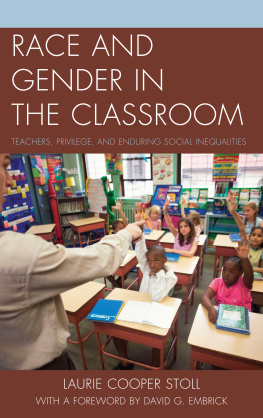

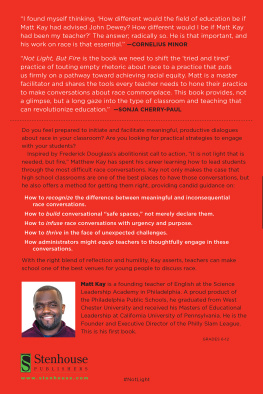
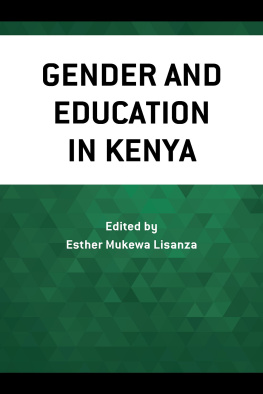
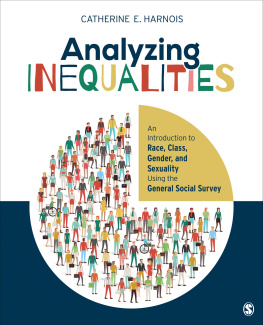
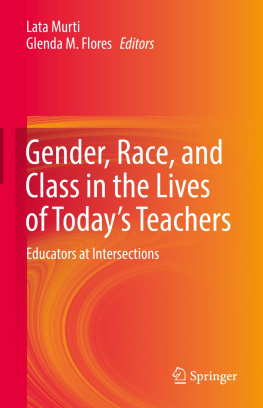
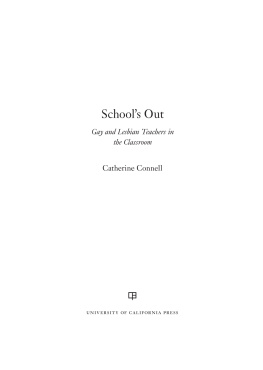
 TM The paper used in this publication meets the minimum requirements of American National Standard for Information Sciences Permanence of Paper for Printed Library Materials, ANSI/NISO Z39.48-1992.
TM The paper used in this publication meets the minimum requirements of American National Standard for Information Sciences Permanence of Paper for Printed Library Materials, ANSI/NISO Z39.48-1992.